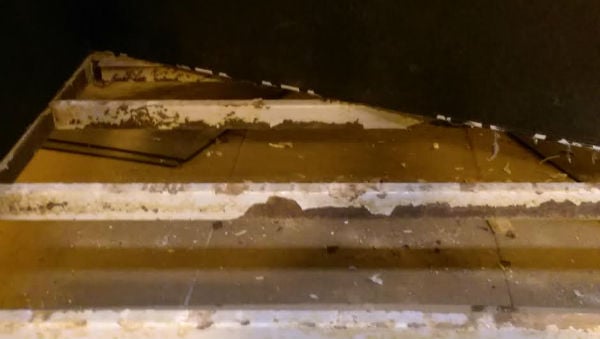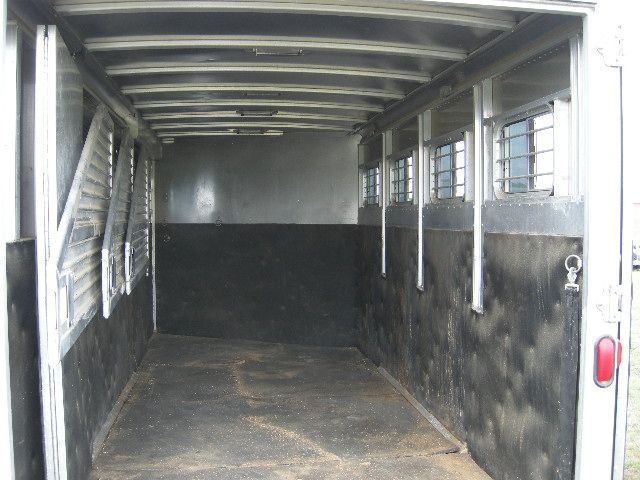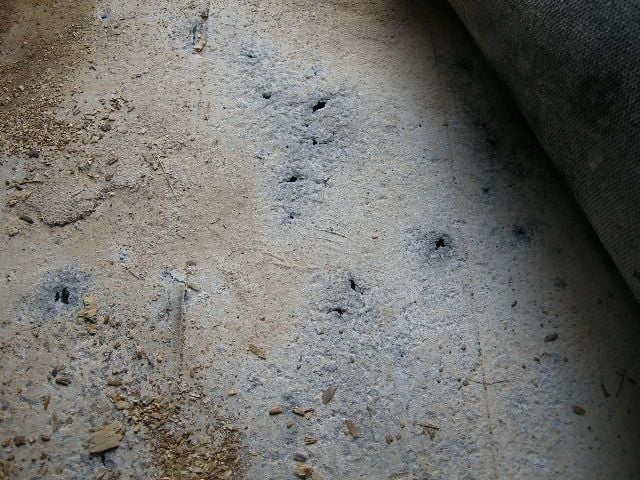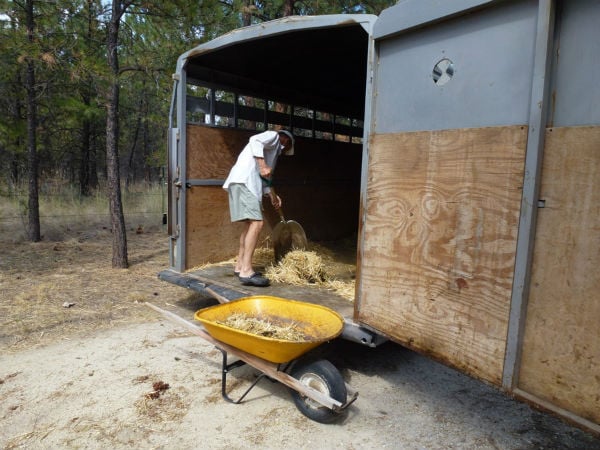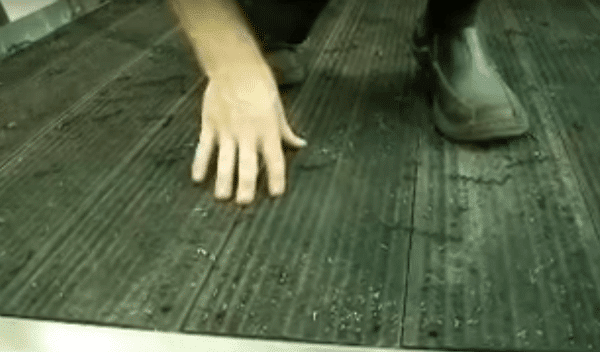Horse Trailer Floor Failure: Is Your Trailer Floor Strong Enough?
In a grisly accident, a horse fell through the floor of its trailer during travel and had to be euthanized. Photo Credit: Helenair.com
In July of 2011, Horse and Hound magazine reported that a horse had fallen through the rotten floor of its 2-horse trailer in Aylesbury, England during travel. The 17-year-old 16-hh gelding had scrapes on the front of his hoof, a ripped hind bandage, and two deep lacerations. His fetlock joint bone was visible. After a 2.5-hour surgery, he was placed in a foot-to-hock cast for a long and painful recovery.
Later, in July of 2014, a 40-foot trailer was entering the on-ramp to the H-1 highway in West Oahu, Hawaii, when one of the horses fell through the broken floor of the trailer. With the trailer still in motion, his legs became wedged between the underside of the trailer and the pavement below before the driver realized they should stop. The horse died.
Sadly, these are not the only stories out there of horse trailer floor failures. That is why it is so vitally important that you ensure your trailer has a strong flooring type that is well maintained. There is a lot of misconception out there, but we are going to share some pros and cons of each flooring type.
Factors to Consider: Horse Trailer Floor Materials
There are several factors that you should consider when choosing the flooring type for your next trailer.
Durability: First off - durability. Make sure that the material is going to be able to stand the test of time and provide trusted strength year-after-year. Believe it or not, some trailers are made with basic plywood floors, which can easily rot when moisture is introduced. This is just one example of a flooring type that is not durable and certainly not safe. Let’s remember that horses are heavy animals that produce lots of manure, stomp their feet, and create highly acidic urine. This urine will break down the flooring material over time if not properly maintained and regularly cleaned.
Heat Transfer: Next, consider heat transfer. The inside of your horse trailer can act like an oven in the summer time so it’s important that your flooring material isn’t contributing to the problem. If the floor is made of a conductive material, then heat is transferred from the road directly into your horse’s hooves. (Watch out: Aluminum flooring is extremely conductive!)
Noise & Vibration Transfer: Noise and vibration are the next factors to consider. Some materials do a better job of dampening noise and vibration from the road. Vibration transferred into your horse’s legs will cause fatigue while noise will add to their overall stress level. Both are things you want to avoid when traveling to an important event.
Maintenance: Some trailers require a mat and some don't. During cleaning, these heavy mats need to be removed, the floor hosed down, allowed to dry fully, and then mats replaced. This is a bit of a hassle after a long day on the road, but failure to clean properly will cause some flooring types to corrode faster.
Cost: Last of all, we will consider cost. Yes, some materials are less expensive, but if this comes at the price of safety, then we really aren’t interested in saving a few bucks.
3 Types of Horse Trailer Flooring: Aluminum, Lumber, and Rumber
Aside from the plywood mentioned before (seriously folks!?), there are three types of commonly used flooring materials for horse trailers. These are aluminum sheets or planks, treated wood, and an artificial material called rumber. How do they stack up against each other? Let’s check it out!
Aluminum Flooring
Aluminum is actually an extremely poor choice of trailer flooring material. Are you surprised? Let’s take a look at the specifics…
Brad Heath, owner of Double D Trailers, explains. “Many manufacturers use aluminum sheets as a quick solution to install a floor. It cuts down on labor and reduces overall production cost.” He continued, “Unfortunately, it transfers more heat, noise and vibration back to horse’s feet and legs than any other flooring material. The only advantage in aluminum or metal flooring is cost savings associated with manufacturing. From the human and horse perspective, there aren’t any advantages.”
Since aluminum is a highly conductive metal, it is easily able to transfer heat from the road up into the trailer compartment. In addition, noise and vibration will elevate the stress level of your horse and tire them out before they even reach your destination. Perhaps the scariest reason to avoid aluminum is its ability to corrode over time.
One of the biggest reasons that people choose aluminum over lumber in their 2 horse gooseneck trailer is the misconception that “only wood rots.” Yes, untreated lumber does not do well when exposed to moisture over an extended period of time, but aluminum does no better! “Horse urine tends to have a negative reaction with metal when exposed for extended periods of time. Eventually, metal will corrode from urine unless the metal is properly maintained and cleaned after each use. Aluminum first begins to “pit” and eventually white rust or oxidation will occur.”
Brad sees this all the time.
He received a text message just three days ago (while this article was being written) from a woman who was experiencing problems with her aluminum trailer floor. She wrote, “I was just wondering what kind of wood to use to replace the floor in my horse trailer. The floor had a black undercoat on top of the aluminum so you couldn’t see the floor. We took the black stuff off and the floor looks like acid was poured on it in one spot!”
The aluminum flooring was rusting away right beneath her horse’s feet! Brad recommended to her that she replace her floor with pressure treated yellow pine lumber.
In this aluminum horse trailer, the owner lifted up the first layer of flooring to find acid-like corrosion. The entire floor needed to be replaced to maintain safety.
To provide another example, he took an aluminum trailer in on trade and received an unpleasant surprise. At first things looked fine, but when he pulled back the rubber mats, he found a floor pock marked and pitted with white rust. The previous owner had no idea that his horses had been in danger of falling through the floor at any second! The entire floor was replaced with lumber before being resold.
This aluminum horse trailer looks fine at first glance, but when you lift up the rubber mats, you can see that the aluminum floor below is pitted with white rust. The strength has been severely compromised!
An aluminum floor can be extremely weak once the oxidation process has begun. Along with the heat, noise, and vibration issues, it’s clearly not a good option for flooring.
You will find a 75% reduction in heat transfer just by going with either the lumber or rumber options presented next.
Treated Lumber Flooring
Many of the benefits found with lumber are going to be identical to the composite material rumber. Both of them have reduced noise, vibration, and heat transfer. Both of them are going to provide a long-term durable solution when properly maintained. The main difference between the two is how they need to be maintained.
Many people will argue that wood rots so it’s a poor choice. First, let’s make an important point. When we recommend lumber, we mean pressure treated wood flooring. If a manufacturer uses side-to-side tongue and groove boards or worse yet, untreated wood, there is definitely a risk of rotten floorboards.
At Double D Trailers, we use a 2x8” pressure treated yellow pine for all of our wooden floors. Brad explained, “So far, in 19 years, we have yet to replace board on a trailer we built with a wood floor. In comparison to aluminum, wood transfers less heat, noise, and vibration so it’s safer for horses.”
With a treated lumber floor, it’s always a good idea to remove the mats, hose down the floor, and let it fully dry to maintain the quality of the wood.
As mentioned before, it’s still very important that you properly maintain your lumber flooring. Moisture is your enemy, so anytime a horse urinates inside the trailer, be sure to remove the mats, spray it down with a hose, and let the interior fully dry before replacing the mats.
Rumber Flooring
Rumber flooring is the final option available, and you guessed it, it’s the BEST option too! Besides its reduced transfer of noise, heat, and vibration, rumber is a super tough and durable material that will protect your horses for years to come. In fact, it comes with a lifetime warranty from Double D Trailers. Rumber flooring is a better choice to deal with horse urine as well since the floors will not oxidize or corrode when exposed.
But what is rumber? This is a recycled tire product that looks a lot like dark grey colored boards when placed on the trailer floor. Brad shared, “Rumber transfers the least amount of heat, noise and vibration in comparison to wood or aluminum.”
Rumber flooring is the best option for flooring since it reduces heat, noise, and vibration transfer into your horse’s feet. Plus, it is easy to maintain and extremely durable.
The main advantage with rumber over lumber is the ease of cleaning. “It eliminates the hassle of removing stall mats since no mats are required.” This will save you some clean up time after a long day at a horse show.
Brad shared that they haven’t received any negative feedback from rumber for any customer they have sold to. “Rumber is the best flooring all around and would be our top recommendation to you for ease of cleaning.”
Here’s the breakdown of what we’ve discussed so far…
|
Aluminum |
Treated Lumber |
Rumber |
|
| Provide Durability |
Yes* |
Yes* |
Yes |
| Reduced Heat Transfer |
No |
Yes |
Yes |
| Reduced Noise |
No |
Yes |
Yes |
| Reduced Vibration |
No |
Yes |
Yes |
| Low Cost |
Yes |
Yes |
No |
| Easy-to-Clean (No Mat Needed) |
No |
No |
Yes |
*These products provide durability with regular cleaning and maintenance.
You have several options to choose from for your horse trailer floor. Just make sure that you come to the sales table prepared to weigh the pros and cons of each type. Your best bet is to avoid aluminum flooring all together and go with either a pressure treated lumber or composite rumber materials. Both of these options will provide durability, minimal heat, noise, and vibration transfer, and most importantly provide a safe flooring for your horse.
Contact Brad at Double D Trailers to learn about designing a custom horse trailer.


